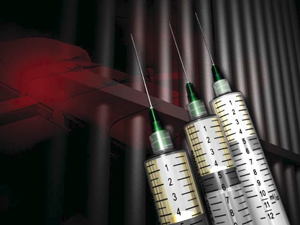Texas, pharmacies clash over execution drugs
By Ramy Srour | Last updated: Oct 16, 2013 - 9:01:50 AMWhat's your opinion on this article?

|
The move comes after foreign drug companies have largely stopped exporting drugs for lethal injections to the United States, forcing those U.S. states that still impose death penalties to look to domestic compounding pharmacies to supply them with the required drugs.
According to the U.S. Food and Drug Administration, pharmacy compounding is a practice in which a licensed pharmacist combines, mixes, or alters a drug’s ingredients to create a medication specifically tailored to the needs of an individual patient.
The Texas Department of Criminal Justice’s refusal has to do with the drug pentobarbital, a substance usually administered as an animal anesthetic and as a remedy for epilepsy and seizures in humans. The move came only a few days after one of the two companies involved, Woodlands Compounding Pharmacy, had expressly requested that the drugs be returned.
“The drugs were purchased legally and we were upfront with the vendors that their names would be subject to public disclosures after the purchase,” Texas DCJ’s spokesman Jason Clark told IPS. “We are not going to return the drugs.”
Mr. Clark declined to offer any additional comments, as the issue is currently at the center of litigation in Texas.
Calls by IPS to WCP for comment were not returned by deadline. However, in an Oct. 4 letter, the owner and pharmacist-in-charge of WCP demanded that the DCJ “immediately return the vials of compounded pentobarbital in exchange for a refund.” According to the company, the sale, which saw WCP providing the state of Texas with 8 doses of pentobarbital, took place because Texas had misrepresented the facts.
“Based on the phone calls I had with [the Texas] DCJ, it was my belief that this information would be kept on the ‘down low’ and that it was unlikely that it would be discovered that my pharmacy provided these drugs,” WCP’s Jasper Lovoi wrote. “Now that the information has been made public, I find myself in the middle of a firestorm that I was not advised of and did not bargain for.”
The letter is now being used as evidence in a lawsuit filed in Texas challenging the execution of 3 prisoners on death row.
The other company involved in the controversy, Pharmacy Innovation, has also denied any knowledge of the drugs’ purpose. The company said that it was “completely unaware that the drugs … were purchased with the intent to use them for lethal injections,” according to a new report by U.K.-based Reprieve, an advocacy group.
As soon as it was informed, the company reportedly cancelled the order before it could be filled.
Asked for comment, Pharmacy Innovation referred IPS to David Ball, of the Ball Consulting Group, LLC, a health communications firm affiliated with the International Academy of Compounding Pharmacists, a trade association.
“Although it’s true that compounding pharmacies have been approached by some states to provide them with substances that would assist them in certain government practices, we should remember that drugs such as pentobarbital cover only a very small part of what compounding pharmacies do,” Mr. Ball told IPS.
Mr. Ball declined to comment on the controversy between the Texas DCJ and Woodlands Compounding Pharmacy.
A new lethal mix
U.S. states turned to compounding pharmacies for drugs for lethal injections only as recently as 2011. That was necessary after drug companies stopped selling sodium thiopental, the substance previously used for executions in the United States.
These drug companies, most based outside the United States, reported facing legal obstacles because of the unconstitutionality of death penalty in their home countries.
The Italy-based Hospira, for instance, announced in 2011 that it would stop producing the drug altogether. The British government, too, banned the export of ST.
That same year, the Denmark-based Lundbeck announced that it would “deny distribution of [pentobarbital] to prisons in U.S. states currently active in carrying out the death penalty by lethal injection.”
So far, the domestic compounding industry has offered a viable alternative to U.S. states still carrying out the death penalty. Texas, Pennsylvania, Colorado and South Dakota, for instance, currently rely on compounding pharmacies for their supply of pentobarbital.
But the recent developments in Texas suggest that this trend may be short-lived.
Death penalty opponents are pushing the U.S. FDA to outlaw the practice of compounding pentobarbital. Thus far, however, the agency has refused to do so, noting only that the broader practice of compounding is currently under scrutiny. (IPS)
INSIDE STORIES AND REVIEWS
-
-
About Harriett ... and the Negro Hollywood Road Show
By Rabiah Muhammad, Guest Columnist » Full Story -
Skepticism greets Jay-Z, NFL talk of inspiring change
By Bryan 18X Crawford and Richard B. Muhammad The Final Call Newspaper @TheFinalCall » Full Story -
The painful problem of Black girls and suicide
By Charlene Muhammad -National Correspondent- » Full Story -
Exploitation of Innocence - Report: Perceptions, policies hurting Black girls
By Charlene Muhammad -National Correspondent- » Full Story -
Big Ballin: Big ideas fuel a father’s Big Baller Brand and brash business sense
By Bryan Crawford -Contributing Writer- » Full Story






 Click Here Stay Connected!
Click Here Stay Connected!








